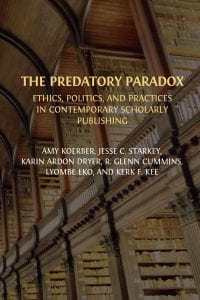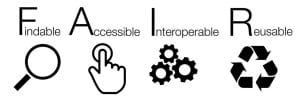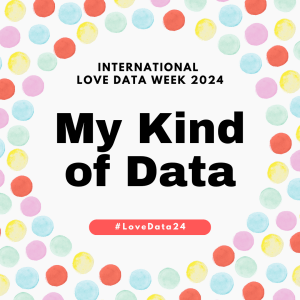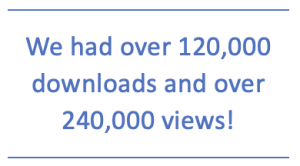The Predatory Paradox – book review
By Kirsty, on 29 February 2024
Guest post from Huw Morris, Honorary Professor of Tertiary Education, UCL Institute of Education. If anyone would like to contribute to future blogs, please get in touch.
 Review of The Predatory Paradox: Ethics, Politics and the Practices in Contemporary Scholarly Publishing (2023). Amy Koerber, Jesse Starkey, Karin Ardon-Dryer, Glenn Cummins, Lyombe Eko and Kerk Kee. Open Book Publishers. DOI 10.11647/obp.0364.
Review of The Predatory Paradox: Ethics, Politics and the Practices in Contemporary Scholarly Publishing (2023). Amy Koerber, Jesse Starkey, Karin Ardon-Dryer, Glenn Cummins, Lyombe Eko and Kerk Kee. Open Book Publishers. DOI 10.11647/obp.0364.
We are living in a publishing revolution, in which the full consequences of changes to the ways research and other scholarly work are prepared, reviewed and disseminated have yet to be fully felt or understood. It is just over thirty years since the first open access journals began to appear on email groups in html and pdf formats.
It is difficult to obtain up-to-date and verifiable estimates of the number of journals published globally. There are no recent journal articles which assess the scale of this activity. However, recent online blog sources suggest that there are at least 47,000 journals available worldwide of which 20,318 are provided in open access format (DOAJ, 2023; WordsRated, 2023). The number of journals is increasing at approximately 5% per annum and the UK provides an editorial home for the largest proportion of these titles.
With this rapid expansion questions have been raised about whether there are too many journals, whether they will continue to exist in their current form, and if so how can readers and researchers assess the quality of the editorial processes they have adopted (Brembs et al., 2023; Oosterhaven, 2015)
This new book, ‘The Predatory Paradox,’ steps into these currents of change and seeks not only to comment on developments, but also to consider what the trends mean for academics, particularly early career researchers, for journal editors and for the wider academic community. The result is an impressive collection of chapters which summarise recent debates and report the authors’ own research examining the impact of these changes on the views of researchers and crucially their reading and publishing habits.
The book is divided into seven chapters, which consider the ethical and legal issues associated with open access publishing, as well as the consequences for assessing the quality of articles and journals. A key theme in the book, as the title indicates, is tracking the development of concern about predatory publishing. Here the book mixes a commentary on the history of this phenomenon with information gained from interviews and the authors’ reflections on the impact of editorial practices on their own publication plans. In these accounts the authors demonstrate that it is difficult to tightly define what constitutes a predatory journal because peer review and editorial processes are not infallible, even at the most prestigious journals. These challenges are illustrated by the retelling of stories about recent scientific hoaxes played on so-called predatory journals and other more respected titles. These hoaxes include the submission of articles with a mix of poor research designs, bogus data, weak analyses and spurious conclusions. Building on insights derived from this analysis, the book’s authors provide practical guidance about how to avoid being lured into publishing in predatory journals and how to avoid editorial practices that lack integrity. They also survey the teaching materials used to deal with these issues in the training of researchers at the most research-intensive US universities.
One of the many excellent features of the book is its authors practicing much of what they preach. The book is available for free via open access in a variety of formats. The chapters which draw on original research provide links to the underpinning data and analysis. At the end of each chapter there is also a very helpful summary of the key takeaway messages, as well as a variety of questions and activities that can be used to prompt reflection on the text or as the basis for seminar and tutorial activities.
Having praised the book for its many fine features, it is important to note the questions it raises about defining quality research which could have been more fully answered. The authors summarise their views about what constitutes quality research under a series of headings drawing on evidence from interviews with researchers in a range of subject areas they conclude that quality research defies explicit definition. They suggest, following Harvey and Green, that it is multi-factorial and changes over time with the identity of the reviewer and reader. This uncertainty, while partially accurate, has not prevented people from rating the quality of other peoples’ research or limited the number of people putting themselves forward for these types of review.
As the book explains, peer review by colleagues with an expertise in the same specialism, discipline or field is an integral part of the academic endeavour. Frequently there are explicit criteria against which judgements are made, whether for grant awards, journal reviewing or research assessment. The criteria may be unclear, open to interpretation, overly narrow or overly wide, but they do exist and have been arrived at through collective review and confirmed by processes involving many reviewers.
Overall I would strongly recommend this book and suggest that it should be required or background reading on research methods courses for doctoral and research masters programmes. For other readers who are not using this book as part of a course of study, I would recommend also reading research assessment guidelines for research council and funding body websites and advice to authors provided by long established journals in their field. In addition, it is worth looking at the definitions and reports on research activity provided by Research Excellence Framework panels in the UK and their counterparts in other nations.
Get involved!
 The UCL Office for Open Science and Scholarship invites you to contribute to the open science and scholarship movement. Stay connected for updates, events, and opportunities. Follow us on X, formerly Twitter, LinkedIn, and join our mailing list to be part of the conversation!
The UCL Office for Open Science and Scholarship invites you to contribute to the open science and scholarship movement. Stay connected for updates, events, and opportunities. Follow us on X, formerly Twitter, LinkedIn, and join our mailing list to be part of the conversation!
 Close
Close










